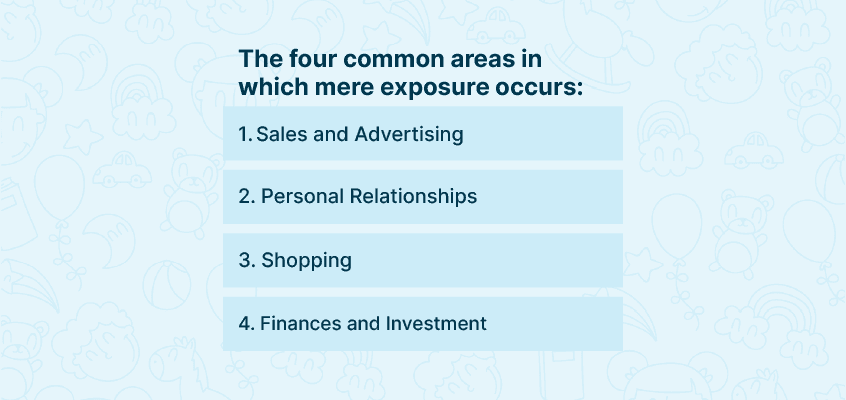Have you ever noticed that some people develop a preference for things/people that are more familiar to them than others? If you have been in a situation before, would you choose a solution you are well aware of or go for something entirely new? Most people are likely to choose the former. Several research professionals studying the mere exposure effect have found that brief exposure to a stimulus before builds up as an automatic preference over time.
Background
Various scientists have studied the mere exposure effect for decades. Gustav Fechner carried out the earliest known study on this effect in 1876. Edward Titchener recorded it, described it as the glow of warmth felt by an individual in the presence of something familiar.
Several other researchers, such as Robert B. Zajonc, continued to explore this effect. Zajonc is the best-known scholar that developed the mere-exposure product and reported its findings in the article “Attitudinal Effects of Mere Exposure,” published in 1968. Experimental and correlational studies showed how living beings exhibit fear or resistance to novel things. However, the fear reduces with enough exposure and liking towards the new thing increases.
At first, Zajonc experimented with language and the frequency of words used. He demonstrated similar results for variousa range of stimuli, such as drawings, expressions, nonsensical words, and ideographs, judging by multiple procedures, such as liking, pleasantness, and forced-choice measures.
Our Wellness Programs
What is the mere exposure effect?
The mere exposure effect can be defined as repeated encounters to a specific stimulus multiple times. This stimulus over time grows on a person automatically becomes used to it and selects it. Just the slightest exposure to a stimulus is enough for a person to perceive it, which is a fascinating phenomenon and often gives rise to choices and biases.
For example, even being slightly exposed to colour is enough to become preferred over colours that one has not seen before.
This phenomenon has extensive personal and social implications. It may influence who people become attracted to, what products, entertainment, and art they enjoy and purchase, and even influence their moods.
Looking for services related to this subject? Get in touch with these experts today!!
Experts

Banani Das Dhar

India
Wellness Expert
Experience: 7 years

Devika Gupta

India
Wellness Expert
Experience: 4 years

Trupti Rakesh valotia

India
Wellness Expert
Experience: 3 years

Sarvjeet Kumar Yadav

India
Wellness Expert
Experience: 15 years
The four common areas in which mere exposure occurs:
1. Sales and Advertising:
Repetitions make the consumers remember the products or services, which unconsciously affects their purchasing behaviour. Marketing and advertising campaigns work on this principle to generate more profit. They run ads so that their brand registers in the consumers’ brains, thus making them more likely to buy their products.
2. Personal Relationships:
In many studies of interpersonal relationships and attraction, Observation tells usit has been observed that the more often someone sees a person, the more pleasing and attractive they find that person. The mere exposure to someone boosts chances of liking them.
3. Shopping:
The shopping choices of many individuals run on instinct rather than sound logic. Many buyers choose products they are familiar with by default. Shopping choices are thus heavily influenced by the mere exposure effect. One may decide to buy a bestseller even when other books are of great value to the reader simply because of familiarity with the author. Another example is that many individuals eat their tried and tested cuisine when on an international trip with numerous novel options.
4. Finances and Investment:
Many investors and stock traders majorly invest in domestic companies merely because they are more familiar with them, even though international markets offer similar or better profitable alternatives.
What is the mere exposure effect in psychology?
According to psychologists, there’s a reason why we seek and select familiarity over the unknown, which is the mere exposure effect. Individuals show an increased liking for a stimulus due to repeated exposure to that specific stimulus—this phenomenon isto as the familiarity principle in social psychology.
EvolutionWe are programmes used by evolution to avoid risky new things that may pose a danger to us. Therefore, we have evolved to experience more positive feelings about people and things we have seen before than the unfamiliar ones. We can also understand and interpret things better when we have already seen them before, known as perceptual fluency.
However, it can impact individuals’ ability for decision-making. Due to this effect, the decisions taken can be suboptimal. Good decisions are taken based on all possible outcomes, not just the familiarity of any particular option. Hence, when choosing between alternatives, one should choose the best option, not just the most familiar one.
Seven examples of the mere exposure effect
- The mere exposure effect is present in academia, and it alters the results of journal-ranking surveys. According to a study, academics ranked journals based on their familiarity with them rather than an unbiased evaluation of the journal’s contribution to the field.
- Individuals tend to date their classmates or coworkers because of the mere exposure effect.
- When picking a movie to watch, people tend to select the one popular in social media circles or the one they have heard the name of more often. And people may not like a particular song the first time they listen to it. However discover that they start liking it more and more each time they hear it, provided they don’t listen to it all the time. Repeated exposure increases the likeability of the song.
- Babies usually smile at people who smile at them more.
- Individuals’ favourite celebrities are typically the ones they see more of on the news and social media.
- When customers repeatedly hear and see the brand, they begin to think it’s more trustworthy and competent due to the mere-exposure effect.
- Analyses of voting patterns have found that a candidate’s exposure strongly affects the number of votes they get.
Thus, the mere exposure effect impacts one’s decision-making abilities and gives them a skewed view of things. It can shape up as wrong decisions and overlooking red flags over time. To understand this better, one can work with a certified therapist from UnitedWeCare to identify their patterns.
















